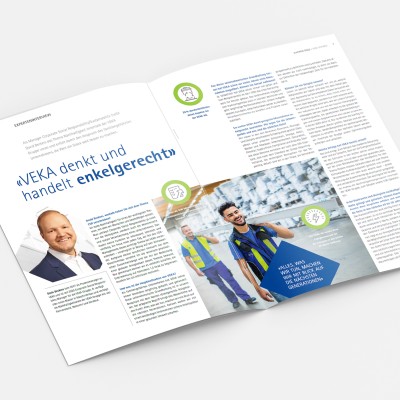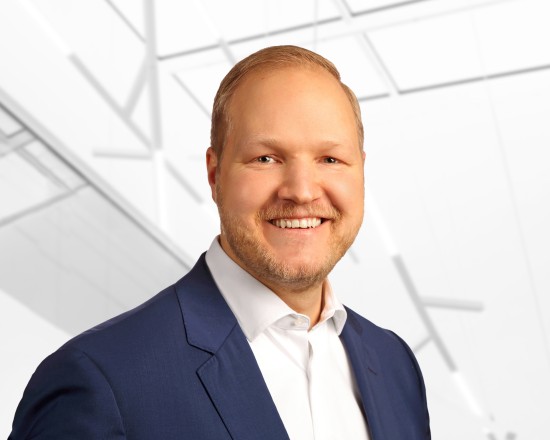
VEKA thinks and acts future-friendly
Interview with David Beckers, Manager CSR/ Sustainability at the VEKA Group
As Manager Corporate Social Responsibility/Sustainability, David Beckers drives the topic of sustainability within the VEKA Group and thus fulfils the family-run company's claim to make the world a little bit better. For our distribution in Switzerland, Mr Beckers has now given an interview on the topic of CSR and sustainability at the VEKA Group as part of the magazine "durchblick":
David Beckers, why have you dedicated yourself to the topic of CSR?
I think sustainability is one of the most important issues that we humans should be concerned with. Now, corporate social responsibility encompasses not only the ecological, but also the economic and social responsibility of a company. This is what makes my role so interesting, educational and diverse. Every day I am happy to be part of the CSR management team and to drive this important topic forward at VEKA - especially with regard to climate change. Due to my professional background in mechanical engineering, I understand the technical-physical connections and I am aware of the importance of the global urgency of this topic. Only together can we perhaps manage to limit global warming to a maximum of 1.5 degrees. In this respect, I am intrinsically motivated.
And what is VEKA's main motivation?
As a family-run company, VEKA has always thought and acted with a particularly long-term perspective. This basic entrepreneurial attitude is captured in our booklet called "Future-friendly". The concise term gets to the heart of the matter: everything we do, we do with the next generations in mind. In concrete terms, we want to create secure jobs in a healthy environment with a durable company.
VEKA introduced its first measures many years ago out of this basic entrepreneurial attitude. Can you build on this?
Yes, in fact VEKA has always done a lot and, for example, built the first recycling plant for windows as early as 1993. The company is also traditionally involved in social areas and enters into long-term partnerships. Our task now is to further bundle these activities, create responsibilities and drive projects forward.
You want to take appropriate measures to make VEKA future-friendly. Where do you place the emphasis and what are the next goals?
We have set different priorities in the three areas of economy, ecology and social affairs. These include emissions, energy, waste, water and wastewater, occupational safety, health, human resources, supply chain, compliance and products. We determine the most important key figures for reporting on all these areas in accordance with the GRI standard, i.e. the standard of the Global Reporting Initiative. We are currently in the phase of defining and collecting the key figures Group-wide. This alone will not make us more sustainable; it serves as a basis for defining the necessary goals for the coming years.
Can you give an example?
Sure. In the area of waste, we look at what waste streams we have and what happens to the waste. Based on the data collected, we are trying to manage the waste streams so that nothing is burned or ends up in landfills anymore, but is only recycled.
Another project will be how we can reduce our emissions and decouple ourselves from fossil dependence. The global approach requires us to know the legal framework and local conditions of all the countries in which VEKA is active. Only in this way can the processes initiated in the future be effective everywhere. That is why we are currently working on creating a common understanding across all countries. In the coming years, we will identify and implement our optimization goals within the Group.
What successes has VEKA already achieved?
There are quite a few. For example, the recycling plant mentioned above and the fact that we have already been able to massively reduce energy consumption in extrusion in recent years. However, it has also become clear to us that we need to promote understanding of the issue among all employees. That's why we have done educational work on the topic of climate change and have shown our employees the connections in a clear and understandable way with the book "Small Gases - Big Effect". The most important part, however, is the development of the sustainability organization within the VEKA Group, for example our CSR specialists.
Ecologically sustainable products are in demand and required in the construction industry. Can plastic windows meet these demands and where is the journey heading in the next 20 to 50 years?
The plastic window will have a very big influence in the future. It is an important building block for saving energy and thus also emissions, not only through improved U-values, but also through solar gains and shading. Thanks to its excellent eco-balance and intelligent smart home functions, it contributes to energy efficiency. In addition, we have the possibilities and the technologies to recycle PVC window profiles at the end of their long lifecycle. In this way, we ensure a closed loop. Ultimately, windows contribute to well-being. They are the interface to the outside world and enhance the quality of life. The PVC window will generally contribute to making the world a little better.
Learn more about our commitment on sustainability:

Davis Beckers joined VEKA in 2017 as Process Manager and has been Corporate Social Responsibility Manager for the VEKA Group since 2020. He holds a Master's degree in Mechanical Engineering and pursues the VEKA Group's sustainability goals with a great deal of expertise, foresight and passion.